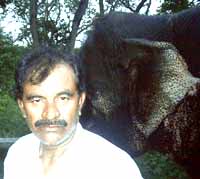Billy Arjan Singh
 In the Southern Buffer of Dudhwa National Park, lies the beautiful Farmhouse called Tiger Haven. It is one of the most scenic places in Dudhwa. The area adjoining the farmhouse is lush green grassland. River Suheli bounds the place on the northern side; and beyond the river lies the dense Sal Forest. The rather Spartan building, with the dense jungles in the background, is picture postcard perfect. This place captures your imagination.
In the Southern Buffer of Dudhwa National Park, lies the beautiful Farmhouse called Tiger Haven. It is one of the most scenic places in Dudhwa. The area adjoining the farmhouse is lush green grassland. River Suheli bounds the place on the northern side; and beyond the river lies the dense Sal Forest. The rather Spartan building, with the dense jungles in the background, is picture postcard perfect. This place captures your imagination.
Tiger Haven is the most romantic place in Dudhwa. Many people regard it as the very emblem of Dudhwa because it is ‘inhabited’ by Billy Arjan Singh. This grand old man was a legendary wildlife conservationist. His fame has spread far and wide. In the yea r2004, he was awarded the Paul Getty Award for Conservation by the World Wildlife Fund for Nature.
Billy had campaigned for the cause of wildlife conservation for much of his life. And he pursued the cause zealously. He was admired and respected even by his bitterest foes for his devotion to wildlife. That Billy has pursued this cause voluntarily makes his contribution even more remarkable. Billy, Tiger Haven, and Dudhwa form an organic entity.
Billy was born in the Era of the British Raj. He was a typical product of that age. The myth of the ultimate superiority of anything British was firmly entrenched in the popular imagination (even if it was British Shit). Thus, the most barbaric, stupid and monstrous of all the British buffooneries in India, Shikar (or hunting or gaming or whatever), was adopted with great gusto by the Indians. The Indian Royalty, the Rajahs, and Maharajahs, had always done it; soon the bureaucrats, government servants, armymen, industrialists, politicians and your name it brazenly participated in the ‘manly sport’ of wildlife massacres. Perhaps they even outdid their colonial masters. Initially, Billy too was no different. But he soon realized his past follies. He bid ‘Farewell to Arms’ and became an ardent supporter of wildlife conservation.
Billy was a product of this age in his tastes and mannerisms, but only so. His thinking and approach were quite non-conformist; quite unlike the conventional British. What if he had been an obedient son and as advised by his parents, joined the government service? What if he had been a disciplined soldier in the army? What if he had not ventured at all to the forsaken region of Terai? What if he had been content with farming? What if he had decided to get married? What if he had decided to live in peace? What if he had decided to adopt a bureaucratic approach of writing letters and avoiding action? What if he had not adopted strong-arm tactics against poachers and infiltrators? Then what?
Then perhaps, Dudhwa would have been lost forever. Not merely the Sal jungles, the marshes, swamps, grasslands and wildlife; but also the very memory of the Terai. For who else has documented the treasures and pleasures of the Terai! Billy’s books preserve for us the Legend of Terai. His books tell us the story of a Paradise Lost. But his books are not just sweet nostalgia; they are pearls of wisdom for the policymakers and future generations about Environment and Wildlife Conservation. Let us all heed his precious words.
The guardian angel and International salesman of Dudhwa is not in our midst. Dudhwa has lost its greatest friend and most passionate lover.
Billy gazes at the jungles in despair. He wonders whether his lifelong penance has been in vain. But surely, if the jungles and inhabitants of Dudhwa survive, Billy’s soul will Rest In Peace at the Tiger Haven Cemetery (where his beloved companion pets lie buried). This will be a far greater tribute to him than any International Award.
AN INTERVIEW WITH BILLY ARJAN SINGH
Do you think our jungles and wildlife can be saved?
No! And even if they are saved, I will not live to see it.
Note: The legendry Mr. Billy Arjan Singh breathed his last on 1st January 2010
INTERVIEW WITH MOHD. NASSEEM
(the Birding expert at Dudhwa National Park)

What inspired you to take up bird watching?
I came to Dudhwa in the year 1976. I was assigned the responsibility of taking the tourists for sight-seeing. During those days, Dudhwa was very popular with many bird-watching groups from Europe. I used to take these groups to different spots in Dudhwa. Their Ecstasy, upon sighting the Forest Eagle Owl, Fish Eagle, Tawny Eagle, Brown Fish Eagle, Bengal Florican, puzzled me. What is so amazing about this activity, I thought, and my journey had begun.
What is it that makes bird watching so wonderful?
The sheer diversity of forms; you see there are more animals in the sky than on the earth. There are 1200 species of birds in India; I have a personal checklist of 423 species at Dudhwa. Identifying a species is really exciting. For e.g. the warbler family; there are minor differences between the two species. When you are able to observe these insignificant details and distinguish one species from the other, you feel so delighted, so overwhelmed.
Moreover, bird watching can be done anywhere: at your garden; in the countryside; scrub forests and dense jungles. A bird watcher delights in his own colorful world. He develops an immense sensitivity for Nature and Wildlife.
What have been the most fascinating moments of your journey?
I live and relive the mating ritual dance of the Peacock. Did you know that this dance is observed by 4-5 hens! I have seen the mating that follows the dance. The peacock selects a hen from the spectators. It mounts upon the hen for about 30 seconds. And having relished the pleasures of the union, the two separate. The joy of this sight can never ever seem routine. I also find the Bengal Florican’s mating ritual every interesting. The male hovers in the air for a while and a large pouch emerges from its neck.
I have learned many a lesson about the Instinct and Struggle for Survival from the World of Birds. I was amazed to see an Indian Myna courageously defend its fledgling against a Shikra (Sparrow-hawk). In the World of Nature, your survival depends upon overcoming that ephemeral moment of fear. If in a split second, you demonstrate your strength and mask your fear, you might live. I was once attacked by a bear; that could have been my end. But since I did not panic, I was able to put a façade of my strength and escape its clutches.
Your tips for bird watchers………
Bird watching is so simple. Get a pair of binoculars and Dr. Salim Ali’s Book; start exploring villages, graveyards, shrub forests or just observe the Banyan, Bo or Mahua trees (especially when they flower).
What future does visualize for Dudhwa?
The future of Dudhwa or any other jungle of our country will entirely depend on our population. More people means we need more land and more resources. And then we’ll go about exploiting our precious forests for agriculture, industry and settlement.
INTERVIEW WITH DR. RAM LAKHAN SINGH,
FOUNDER-DIRECTOR DUDHWA NATIONAL PARK

What makes you such a wonderful writer?
I believe that every person on the earth is endowed with some unique natural gift. An individual could be an artist, poet, writer……however, in 95% of us, this talent remains dormant. I realized my talent as a writer and made a determined effort to nurture it.
Moreover, I am a man of the field. I have spent 20-25 days a month away from my family amidst the dense wilderness. Early morning and late evenings, the time when the jungles throbs with activity, I would station myself on the machan (watch tower). Many an hour would elapse observing the Natural World. I have brought forth before the reader what my memory retained over a period of time. I have put in words what is worthwhile. The insignificant details have been chaffed off.
It is my effort to share with the reader a vast gamut of experience. I am not an event or textbook writer. My approach is to make my material simple, readable and enjoyable. I think that there is nothing so complicated on earth that cannot be expressed in a simple and understandable language even for those who are entirely unfamiliar with the subject.
And, of course, I have taken up writing for inner fulfillment. I have not been under the compulsion to earn through my writing.
What attracted you to the Forest Services?
I started my career as Physics Lecturer at Ervin Christian College, Allahabad. That was in the year 1966-69. I was a successful teacher. In fact, I used to write stories on the concepts and theories of Physics (my inner talent, you see). But, while I enjoyed my work thoroughly, I wanted a better-salaried job; I wanted a secure job as I belonged to an ordinary middle-class family. So, I appeared for the Civil Services examination and was selected for the Forest Services. I would not say that I had a great inclination for this service. I simply desired a good salaried job.
You have enacted many roles; you have been a teacher, a civil servant, a conservationist, and also a writer. What role have you relished most?
I am a responsible person. I do not allow my likes and dislikes or my whims and fancies to deviate me from my basic duties. I firmly believe in God and that I am executing His Grand Design. The work in hand has always been my first priority. I have thus performed all my duties with great sincerity. Even now, when I have retired, my firm commitment to my present assignments continues.
And what are your present assignments?
My household chores; three hours of gardening every day; reading; manning my open house study room between 6-8 PM; and my teaching assignments at the University. It has been a very active retirement.
You have traveled far and wide. You have the first-hand experience of many National Parks throughout the world. What makes Dudhwa just one of its kind in the entire world?
There are three aspects that make Dudhwa unique. Firstly, Dudhwa is the last remaining extensive Grassland of the foothills that survive on the planet. You see, you cannot create more Grassland. The Grasslands are the most threatened eco-system because they are not considered as a forest type. The grasslands have been rated as a wasteland even by the Forest Department. They have thus borne the onslaught of not just ‘development’, but also conversion to agricultural land and plantation forest.
Then, Dudhwa is possibly the only place on the earth where Five Species of Deer survive in one place in large numbers. And finally, Dudhwa is a very prominent and well protected Tiger habitat.
What do you think is your most significant contribution to Dudhwa National Park?
I glorified Dudhwa to the politicians and policy-makers and succeeded in getting it established as a National Park! I sold them the idea of the international significance of Dudhwa. The fact is you cannot achieve anything without the support of these two people.
Before being established as a National Park, Dudhwa was intensively managed by State Government. It yielded revenues of Rupees 20 Million annually through timber and other forest products in those years. Grasslands were being converted into plantation forests. Timber was being supplied to the railways for sleepers. All of this would come to a grinding halt if Dudhwa was declared a Protected Area. Naturally, the move was opposed by the entire department. But I convinced the most vehement critic. The greatest support came from the then Prime Minister, Mrs. Indira Gandhi.
How did you sell the idea of Dudhwa?
I would say through the personality cult I built about myself. I had returned from Australia after my specialization. I had developed the reputation of an ardent Field worker. So, I romanticized the idea of Dudhwa through my writings, interviews and lifestyle. Everyone was impressed. They associated with my dreams. It is human psychology to associate with big things and big ideas. Ideas are valued. They are the biggest commodity to be sold.
I can illustrate this with an example. The rhino re-introduction project was taken up the FAO and the Government of India. There were many claimants and many sites were explored for the project. But I convinced the authorities that if you want the project to succeed, please trust me.
What is it that strikes your mind, when you think of Dudhwa?
The tall trees all around and not a speck of civilization!
What is your most memorable experience of Dudhwa?
It was my first encounter with the man-eater tigress; the (in)famous Tigress of the River Suhail.I still cannot believe it. I wasn’t sure whether I’ll come back alive. She could have killed me.
Now, this tigress had caused havoc in the vicinity of Dudhwa. It had also killed two of my staff members. As a leader, I had to face the challenge. It was the call of duty. Having tracked her on the back of the elephant, I decided to strike. I had no experience of hunting whatsoever. Besides, there was neither a proper backup nor any security arrangement. It would have been prudent to go back and organize something like the shikar expedition of the bygone era; with all the paraphernalia, the elephants, the night vigil on the machan, the bait and the wait for the tigress. But that would have been a case of an opportunity lost forever. I took the chance at hand.
I made a mathematical calculation. If a tiger has to be shot dead, then either its heart or brain should be targeted. And there she stood, huge and menacing. I provoked her. She leaped upon the elephant in rage. I was within her range and grip. She could have killed me. But in her jumping posture, she exposed her heart. My tactics worked. I seized the golden opportunity. And shot her dead.
It is unbelievable. It could have been either of us. It is a miracle that I am alive. I firmly believe that unless God wishes, nothing ill can happen at all.
Mr. Billy Arjan Singh was also there with you………..
Yes! That was a part of my calculation. I had roped him because I wanted to confuse the tigress. The tigers recognize their master’s scent. Billy Arjan Singh’s presence confused her. She could not analyze whether she stood before a friend or foe. That gave me the edge.
(Note: The man eating tigress was none other than Tara, the pet tigress of noted conservationist Mr. Billy Arjan Singh. She had escaped into the jungles of Dudhwa.)
At first sight, our jungles seem so lustrous, green and healthy. They are far more scientifically managed than in the past. Then why is sighting wildlife so rare?
The greenery of the forests is mostly of the non-palatable kind. It gives a good look, yes! But it has little fodder value. The non-palatable grasses have strangled the palatable ones. Mind you these are not exotics. They are indigenous but are hardy. Since they are not being grazed, they are thriving.
Besides, the management of herbivores is lacking. The herbivores venture inside the agricultural fields for grazing at night. They are killed there.
What can be done to address these problems?
Selected Areas in the forests would have to be ploughed to create fodder value plants for the herbivores. These pockets will have to be fenced. Wildlife cannot be saved without human intervention. There is a need to change the current approach of Protection to Resource Management. We cannot leave this work to Nature alone. If left to Nature, only the thorny and hardy shrubs will survive.
But most importantly, the Forest Services need to be strengthened. We need professionals. The department needs real heroes. It is absolutely essential to get rid of the ‘administrative job’ trap. The people must take pride in working on the field.
Can jungles and humans co-exist in our country?
I think it is possible. About 21% or one-fifth of our land area is a notified forest. This means that we have land for our jungles and wildlife. We have the manpower to protect our forests. Our conservation laws are the best in the world.
India is respected all over the world for conservation. Tiger protection would not have been possible anywhere else in the world. It is impossible to even imagine the existence of a free ranging carnivore (the tiger) or 70% of the Asian Elephants in such an overpopulated country.
What can be done to sensitize the common man towards Nature, Environment and Wildlife?
It has been a tragedy that an entire generation was devoid of the knowledge of Nature. But there is a positive change now. Forests are better known. Their non-marketable values have been recognized and accepted. The recent Supreme Court decision of introducing Environment Science as a compulsory subject in schools is another commendable step.
You said you believe in ‘God’s Grand Design’, do you think there is some ‘Grand Design’ behind the present pathetic wildlife scenario?
(After a studied silence) No! I don’t think so.
AN INTERVIEW WITH IDREES KHAN, MAHAWAT

Tell us something about yourself?
My name is Idrees Khan. I am the Mahawat at Dudhwa (The Elephant driver). I was recruited here in the year 1972. I acquired the professional skills from my grandfather, Munnan Bakhsh. He too was an employee here. Since my childhood, I would visit Dudhwa and get hooked to this profession. This is our family tradition where the baton has passed from one generation to the next. But my kids will definitely not adopt this profession and neither do I want them to.
How do you train your Elephants?
The Department sources the Elephants from the Animal Fairs of Gorakhpur and Sonpur. The elephants thus are already trained to obey the commands. When they formally join our team, we first take them for an orientation in the forests. We give them a first hand experience of the wildlife along with the other team members. They must overcome their fear, especially the fear of wild elephants. It takes around 2 to 3 months to groom them. During my career, I have trained three elephants.
What is the difference between driving a motor vehicle and an elephant?
Since I have driven both, I can explain. You see, the elephant is not just an intelligent creature, she is also very sensitive. So you must have an idea of her psyche. You don’t need to know the psyche of a jeep or car (laughs). Then, riding an elephant involves all your limbs and senses; your hands, your feet and your mouth for the commands. The footwork needs to be especially good.
You said one needs to know the psyche of an elephant. How do you assess the psyche?
Let me give you an example. Early morning, I have to report for duty, but my elephant is behaving erratically. I try to analyze her conduct. I examine her body temperature. If the body temperature is high, I give her a bath. When she dries up and her normal temperature is restored, she is given a 15-minute rest. It is only after the rest that we arrange the howdah on her back. One needs to very careful with this creature.
How do your elephants react when they see wild elephants?
Well! We employ female elephants only. This is because females can be trained with relative ease. A male elephant can go berserk during mast; we’ll have no control over him.
The wild male elephants are often keen to date our elephants. But our elephants are really fearful of the wild males. When approached, they retreat and trumpet in fear. We come to their rescue and fire in the air. The fire is good enough to put the males to flight.
How would you describe your relationship with Dudhwa National Park?
I have devoted my life here. I have worked hard. I have learnt so much about Life and Nature. In fact, I am still learning. Recently, for the first time in my life, I measured the size of the rhino feet. It was a thrilling experience. I am a part of the special group that tackles the Man Eater Tigers. I have earned the respect of my colleagues and my officers. I say this with great pride.
Your advice to the tourists……….
It is only during the early mornings and evenings that you can enjoy the wildlife. So, please be punctual. Please report on time.
What future role do you foresee for the Mahawats?
I think the Mahawats will continue to play an important role, even in the age of All Terrain Vehicles. The utility of an elephant in a jungle cannot be replaced by any motor vehicle. Moreover, the new chaps are far smarter than us.

